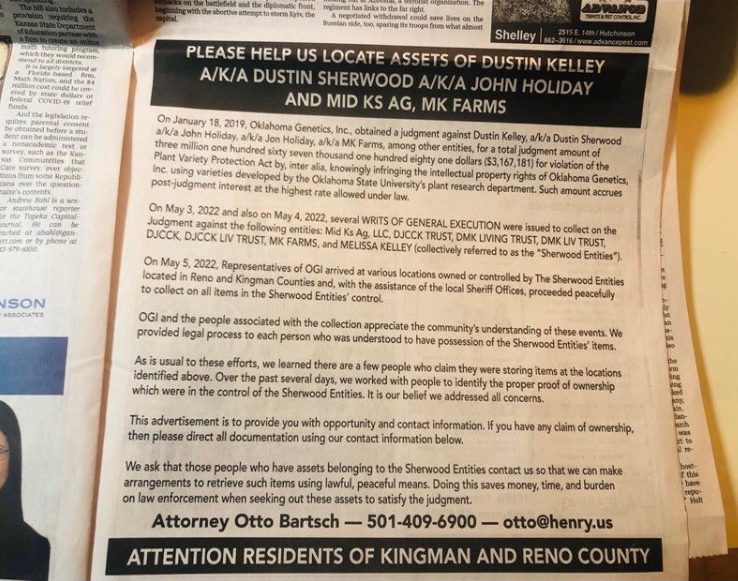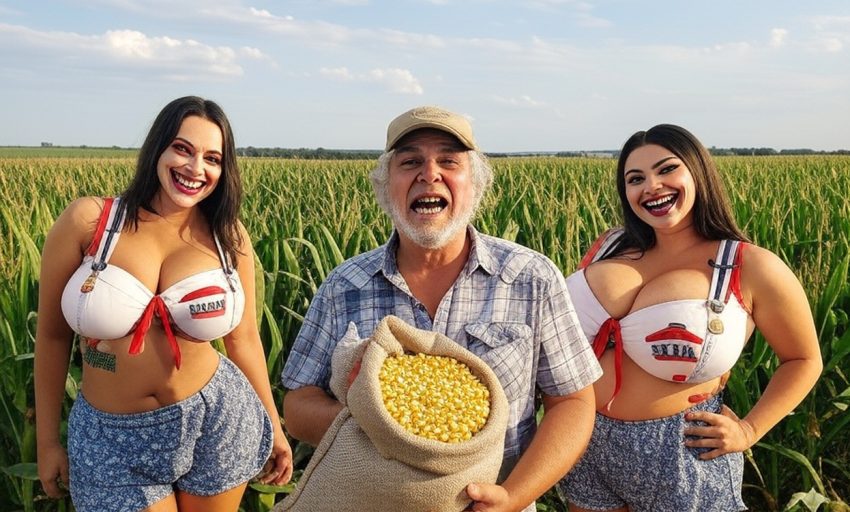In an industry dominated by big players like Bayer and Corteva, many farmers are desperate for affordable, independent seed alternatives. The promise of lower-cost options without the corporate strings attached is appealing, especially amid rising input prices and market pressures. However, not all “alternatives” are created equal. Enter Dustin Sherwood, also known as Dustin Kelley and John Holiday, the man behind RedLineHybrids. Operating under the X handle @Dusty3080467325 (branded as “Defund the USDA 2.0”), Sherwood promotes his seed business with aggressive anti-establishment rhetoric, cheap prices, and bizarre tactics, including posts featuring provocative images to grab attention. But a deep dive into his history reveals a pattern of deceit, legal violations, and burned victims that should make any farmer think twice before handing over cash on a handshake deal.
AgroWars is here to expose the facts. While the need for competition in the seed sector is real, Sherwood’s operation appears more like a word-of-mouth scam than a legitimate enterprise. There’s no visible evidence of a proper seed treatment facility, and his track record is riddled with fraud, infringement, and false promises. Farmers, proceed with extreme caution, or better yet, steer clear entirely.
@PetersenFarms @ndrockfarmer guys I saw you commenting on the redline hybrids. This guy is a known crook and fraud. See the pictures. He goes by several aliases. His real name Dustin Sherwood. Just look up his reputation on AgTalk. Please spread this info pic.twitter.com/FKQs1FlQyE
— Emmitt (@EmmitteastAG) September 3, 2025
Seizure of Assets from Fraudulent Activities
In 2022, Dustin Sherwood, operating under aliases like Dustin Kelley and through entities such as MK Farms, faced a significant court-ordered seizure and auction of agricultural equipment as part of ongoing legal repercussions from his history of fraudulent activities, including equipment sales scams that left multiple farmers out of pocket. The auction, which took place on July 21, 2022 via Purple Wave, targeted assets stored across Kingman, Hutchinson, and Wichita counties in Kansas, encompassing a range of farm machinery tied to Sherwood’s operations.
The seizures extended into 2023, with additional notices for the public auction of specific vehicles, including a 2020 GMC Sierra 2500 HD Denali and a 1972 Chevrolet C60 grain truck, levied in Kingman, Reno, and Sedgwick counties to satisfy outstanding debts. These actions, published in local papers like the Kingman Leader-Courier, highlighted Sherwood’s use of shell entities like Mid Ks Ag, LLC, and various trusts as “alter egos” to shield assets, which we will discuss shortly.

Via AgTalk
This “mass seizure” was not an isolated event, as Sherwood has quite a history of equipment scams.
A History of Deception: Equipment Sales and Scams
Sherwood’s troubles date back years, with multiple reports of him “burning” people in equipment deals. In 2014, a forum user on AgTalk detailed how their father purchased machinery from Sherwood, only to encounter major issues from the start. The transaction turned sour, with Sherwood becoming unreachable, leaving the buyer suspecting an outright swindle. The poster urged others in Missouri to help locate him, highlighting a pattern of evasion.
This wasn’t an isolated incident. Discussions on Red Power Magazine’s community forum in 2014 labeled Sherwood as a serial scammer, accusing him of funneling fraudulent activities through an associate named “Missy.” Users warned that he preys on the farming community, using quick sales and disappearing acts to avoid accountability. One thread explicitly stated he was “scamming ppl, and ppl need to band together so a stop can be put to it.” These accounts paint Sherwood as someone who exploits trust in rural networks, often relying on informal agreements that leave buyers with little recourse.
The $3.1 Million PVPA Infringement Judgment
Sherwood’s legal woes escalated dramatically in 2019 when a federal court in Kansas ruled against him in a landmark case under the Plant Variety Protection Act (PVPA). Oklahoma Genetics, Inc. (OGI), a nonprofit tied to Oklahoma State University, sued MK Farms and Dustin Kelley (an alias for Sherwood) for intentionally infringing on their exclusive rights to the Gallagher wheat variety, which is a hessian-fly-resistant strain popular in Oklahoma, Texas, and Kansas.
The court awarded OGI over $3.1 million in damages, marking the largest PVPA judgment in U.S. history at the time. Sherwood and his operation were found to have illegally sold the protected variety without authorization, undermining legitimate breeders and creating an uneven playing field. The case stemmed from an anonymous tip via the Farmers’ Yield Initiative, underscoring how such infringements harm the entire industry. Sherwood did not appeal, effectively accepting the massive financial hit, but questions remain about how (or if) he paid up, given his history of financial troubles. Maybe he made some other kind of deal, but we can only speculate at this point.
This wasn’t just a slap on the wrist; it was a deliberate violation that cost honest farmers and researchers dearly. OGI’s executive director emphasized the need to stop “willful infringers” to protect quality seed providers.
Federal Conviction for False Statements
Sherwood’s dishonesty extends to federal crimes. In 2009, he was sentenced for making false statements to the Commodity Credit Corporation (CCC), a U.S. Department of Agriculture entity that provides loans to farmers. As a former North Missouri farmer, Sherwood pleaded guilty in December 2008 to inflating his wheat production claims to secure undue loans and benefits. He falsely reported higher yields and quantities than he actually had, defrauding the government and taxpayers.
U.S. District Judge Ortrie D. Smith handed down the sentence on September 9, 2009, ordering restitution alongside other penalties. This conviction highlights Sherwood’s willingness to lie for financial gain, a trait that seems to persist in his current ventures.
2007 Bankruptcy
Sherwood, along with his then-wife Jennifer J. Sherwood, filed for Chapter 11 bankruptcy protection on September 25, 2007, in the United States Bankruptcy Court for the Western District of Missouri (Kansas City division). The case number is 07-50584. This filing came amid financial difficulties tied to their farming operations in northern Missouri, where Sherwood had been involved in wheat production.
The case’s ultimate resolution isn’t fully detailed in accessible public records, but the denial of dismissal in 2008 kept it active for further administration under the trustee. It appears to have been part of a broader pattern of financial instability for Sherwood.
Additional Red Flags: No Website and Many Aliases
In an era where even small-scale seed suppliers thrive by offering detailed catalogs, germination guarantees, and transparent sourcing info online, the absence of a dedicated website for RedLineHybrids stands out. Legitimate agribusinesses leverage websites as virtual storefronts to build trust, showcasing lab-tested varieties, customer testimonials, and secure ordering processes that reassure buyers they’re not gambling on a ghost operation. Sherwood’s reliance on an irreverent X profile, which is riddled with off-color memes and no trace of professional polish, screams shortcut over substance, leaving potential customers to sift through forum warnings and hype rather than verified details. It’s a glaring omission that undermines any claim to reliability in an industry already starved for trustworthy alternatives.
Additionally, his use of aliases, such as Dustin Kelley, College Younger, Missys Boy (his girlfriend is Missy), Mid Ks Ag, and John Holiday (sometimes spelled Jon), is designed to dodge scrutiny. Forum discussions from as recent as 2025 link these names directly to Sherwood, with users warning about his shifting identities in ongoing schemes.
Current Shenanigans: RedLineHybrids and X Antics
Today, Sherwood runs RedLineHybrids, touting glyphosate-tolerant seed corn at $125 per unit, delivered with no frills. He operates another X account @LineRed8039 for promotion, positioning himself as a rebel against “BigAgSeed.” But skepticism abounds: AgTalk threads question the quality and legitimacy of RedLineHybrids, urging people to “Google Dustin Sherwood” before buying.
On X, as “Defund the USDA 2.0,” Sherwood’s bio boasts “RedLineHybrids/SeedWarsSeedCo /Boobs Professional Piano Player (whorehouses only)” and rails against “ClimateSmartGrift & Snake Oil Monkey Piss Agronomy.” His posts mix farming content with crude humor, including images and references to “boobs” to draw eyes, which is just a tacky ploy that distracts from substantive questions about his business. Recent activity shows him harvesting, complaining about yields, and reposting market gripes, but there’s no mention of a certified seed treatment facility. Deals seem to rely on informal “handshake” agreements, with no verifiable infrastructure or third-party oversight.
One X exchange captures the divide: A potential buyer expressed interest in the cheap seed but was turned off by Sherwood’s erratic behavior, to which he responded dismissively, “I am not interested in selling seed to you.” This attitude, combined with his history, screams risk.
A Warning to the Farming Community
The seed industry needs innovation and alternatives, but Dustin Sherwood isn’t the answer. His pattern of fraud, infringement, and evasion—spanning equipment scams, federal convictions, multimillion-dollar judgments, and questionable aliases—makes him a liability. RedLineHybrids may tempt with low prices, but without transparency on sourcing, treatment, or quality, it’s a gamble that could leave you with subpar seed, legal headaches, or nothing at all.
Farmers, do your due diligence. Support reputable independents with proven tracks. As for Sherwood, the evidence suggests he’s more con artist than cultivator. Stay away.



To whom it may concern:
Dustin Sherwood is currently residing in the Yankton County Jail in South Dakota for an out of state bench warrant initially listed for stalking and updated to breach of conditions as well as failure to appear.
Holy shit! Thank goodness we did not pay this con artist. I thought it was a little sketchy redline doesn’t have a website
Yeah my dad learned the hard way buying a stolen tractor from “Jon Holiday”. That guy is a slick talker and gives the impression he means well. The reality is he is a con artist through and through.
I thought the constant porn esque posts on X were distasteful, but the guy seemed to make a lot of sense. The truth is, most con artists do. I had no idea he was John Holiday aka the iron slinger. He defrauded hundreds of thousands of dollars in equipment sales fraud in Kansas a few years back
The guy is bad news wherever and whatever he does. It’s like a thrill game. I tryed buying a combine and was sure glad I figured out he was scamming me before anything happened.